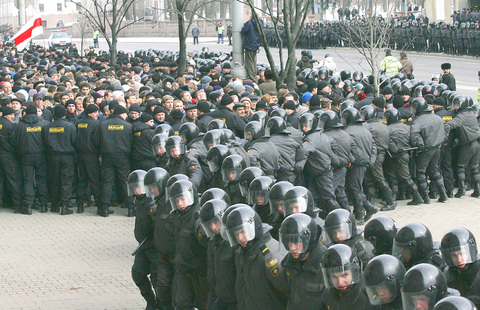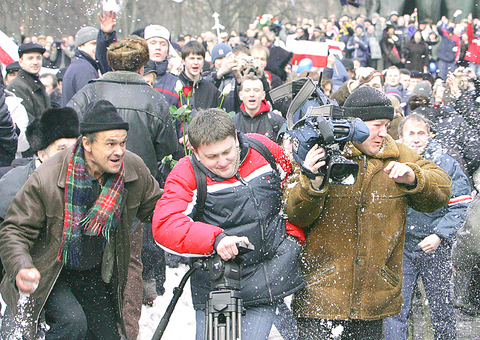Hundreds of Belarusian opposition activists were still in jail yesterday, and the location of one of their top leaders remained unknown one day after mass crackdowns by the government.
The bulk of the detainees were, according to eyewitnesses, being transported to the infamous Uruchie prison outside Minsk, a detention facility run by the Belarusian KGB, and site of the disappearance of opposition activists in previous years.
Aleksandr Kozulin, the No. 2 man in Belarus' opposition movement against authoritarian President Aleksander Lukashenko, was not present in any known prison facility in the Minsk region, his wife told reporters.

PHOTO: AP
"In every prison that we have checked we have been told that Kozulin is not there," an opposition official told the Belapan news agency.
The Minsk prison system reportedly was overwhelmed by the need to process hundreds of detainees. Milinkevich estimated the number of people arrested in a Saturday melee fought through the streets of the Belarusian capital as "over 1,000."
Lukashenko on Saturday ordered police to use force to break up the protests, begun one week ago after the former collective farm boss was re-elected president in a vote condemned by the international community as fraudulent.

PHOTO: AFP
Meanwhile, Milinkevich yesterday called for a temporary halt to protests. He told Russia's Itar-Tass news agency on Saturday that the opposition hoped to mobilize at least 200,000 for fresh protests, but this would require a "strong emotional impulse."
Witnesses said police arrested hundreds of people, including Kozulin, as they charged an anti-government rally in Minsk on Saturday, using clubs and smoke grenades.
Police combed downtown Minsk for hours for opponents of Lukaschenko. Several were cornered and beaten at a department store as customers looked on, then dragged to a police van.
The assault took place near the Opera Theatre building, where demonstrators gathered following a failed attempt to reach central October Square.
The violence ended six days of peaceful anti-government demonstrations, begun last Sunday after Lukashenko won re-election in a poll the West has called fraudulent.
Initial reports that Milinkevich was among those arrested turned out to be false. In his remarks to Itar-Tass late on Saturday, Milinkevich accused the police of using disproportionate force.
The US State Department condemned the crackdown and demanded that Belarusian authorities release all arrested activists, saying they were exercising legitimate democratic rights.
German Foreign Minister Frank-Walter Steinmeier also urged the release of all protestors and specifically cited Kozulin.
Kozulin was beaten by police before submitting to detention and being hauled off, witnesses said.
He was leading an estimated 1,500 demonstrators to a Minsk jail in what he said was an attempt to free previously arrested opposition activists. Police charged the crowd in order to stop its movement, witnesses said.
Belarusian Interior Minister Vladimir Naumov defended the crackdown, claiming that Kozulin had called for Lukashenko's violent overthrow.
Naumov said eight police officers and one demonstrator were injured.
Milinkevich, the loser in Sun-day's lopsided election contest, had called for the demonstration to mark a short-lived Belarusian republic founded in March 1918. Lukashenko banned rallies on the day after he came to power in 1994.
Up to 4,000 anti-government protestors had gathered in central Minsk before the police assault. Pedestrians and bystanders at some locations showed support to the demonstrators, shouting "Fascists" as the police made arrests.
The US and the EU after the election announced plans to sanction the Lukashenko regime by closing some foreign bank accounts owned by Belarusian officials, and by widening a travel ban to Western countries by the Lukashenko entourage.
US President George Bush in a statement declared that he "stands by the Belarusian people ... in their fight for democracy."
Lukashenko has laughed off the sanction threats, saying he owns no foreign bank accounts, and that he and his subordinates have no particular interest in travelling to the US or the EU.

Auschwitz survivor Eva Schloss, the stepsister of teenage diarist Anne Frank and a tireless educator about the horrors of the Holocaust, has died. She was 96. The Anne Frank Trust UK, of which Schloss was honorary president, said she died on Saturday in London, where she lived. Britain’s King Charles III said he was “privileged and proud” to have known Schloss, who cofounded the charitable trust to help young people challenge prejudice. “The horrors that she endured as a young woman are impossible to comprehend and yet she devoted the rest of her life to overcoming hatred and prejudice, promoting kindness, courage, understanding

US President Donald Trump on Friday said Washington was “locked and loaded” to respond if Iran killed protesters, prompting Tehran to warn that intervention would destabilize the region. Protesters and security forces on Thursday clashed in several Iranian cities, with six people reported killed, the first deaths since the unrest escalated. Shopkeepers in Tehran on Sunday last week went on strike over high prices and economic stagnation, actions that have since spread into a protest movement that has swept into other parts of the country. If Iran “violently kills peaceful protesters, which is their custom, the United States of America will come to

‘DISRESPECTFUL’: Katie Miller, the wife of Trump’s most influential adviser, drew ire by posting an image of Greenland in the colors of the US flag, captioning it ‘SOON’ US President Donald Trump on Sunday doubled down on his claim that Greenland should become part of the US, despite calls by the Danish prime minister to stop “threatening” the territory. Washington’s military intervention in Venezuela has reignited fears for Greenland, which Trump has repeatedly said he wants to annex, given its strategic location in the arctic. While aboard Air Force One en route to Washington, Trump reiterated the goal. “We need Greenland from the standpoint of national security, and Denmark is not going to be able to do it,” he said in response to a reporter’s question. “We’ll worry about Greenland in

PERILOUS JOURNEY: Over just a matter of days last month, about 1,600 Afghans who were at risk of perishing due to the cold weather were rescued in the mountains Habibullah set off from his home in western Afghanistan determined to find work in Iran, only for the 15-year-old to freeze to death while walking across the mountainous frontier. “He was forced to go, to bring food for the family,” his mother, Mah Jan, said at her mud home in Ghunjan village. “We have no food to eat, we have no clothes to wear. The house in which I live has no electricity, no water. I have no proper window, nothing to burn for heating,” she added, clutching a photograph of her son. Habibullah was one of at least 18 migrants who died